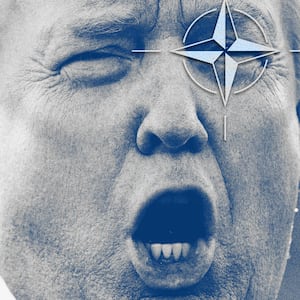Russia has added Estonian Prime Minister Kaja Kallas to a wanted list over her efforts to take down Soviet-era World War II monuments.
“This is just the beginning,” Russian foreign ministry spokesperson Maria Zakharova said on Telegram. “The liberators of the world from Nazism and fascism must answer for crimes.” Other officials from Latvia and Lithuania who have supported the remova; of soviet-era monuments are also on the list.
The revelation that Kallas is on the list coincides with mounting Russian-Estonian tensions. On Tuesday, Estonia’s foreign intelligence service issued a new report warning that Moscow has plans to double the number of troops along its borders with the Baltic states and Finland in preparation for possible conflict with the North Atlantic Treaty Organization (NATO).
European governments have been warning about the possibility that Russia could expand its war beyond the borders of Ukraine for months. “The Kremlin is probably anticipating a possible conflict with NATO within the next decade,” the report states. “For Estonia, Russia’s military reform entails a significant increase in Russian forces near the Estonian border in the coming years.”
As Russia works to build up its forces, European allies need to prepare to bolster their ability to defend against attacks, the report adds. “Defending against a possible conventional attack from such an army would require allied defence forces and defence industries to be significantly more prepared, capable and better-stocked with ammunition and materiel than they currently are.”
Kaupo Rosin, the director general of Estonia’s foreign intelligence service, told reporters that Russia has “chosen a path which is a long-term confrontation,” according to The Guardian.
Kallas, who has been a vocal supporter of Kyiv during the Russian war on Ukraine, said Moscow’s attempt at intimidation would not stop her. “The Kremlin now hopes this move will help to silence me and others—but it won't. The opposite. I will continue my strong support to Ukraine. I will continue to stand for increasing Europe's defences,” she said on social media.
Concerns about the future of NATO’s ability to defend itself against Russian aggression have bubbled up in recent days, as former president Donald Trump, the current Republican frontrunner for the 2024 U.S. presidential elections, revealed this weekend that he had previously warned a NATO member that he would allow Russia to do whatever it wanted with NATO countries that are not contributing two percent of their GDP on defense spending.
“‘You didn’t pay? You’re delinquent?’” Trump said, referring to something he claimed to have said to a NATO member. “‘No, I would not protect you. In fact, I would encourage them to do whatever the hell they want. You gotta pay.’”
NATO members agreed in 2014 to work towards contributing 2 percent of GDP on defense spending, but there is no “delinquency” or “debt” that comes along with that. The alliance members invest that money into their militaries, but don’t pay it to NATO.
NATO Secretary General Jens Stoltenberg sharply criticized Trump’s remarks. “Any suggestion that allies will not defend each other undermines all of our security, including that of the U.S., and puts American and European soldiers at increased risk,” Stoltenberg said.
U.S. Ambassador to NATO Julianne Smith said Trump was irresponsible and putting U.S. troops at risk.
“Encouraging the Kremlin to attack any NATO ally or alliance territory really puts our soldiers—U.S. soldiers and our allies’ soldiers—in greater danger. Doing so, making those types of statements, is dangerous and frankly irresponsible.”






